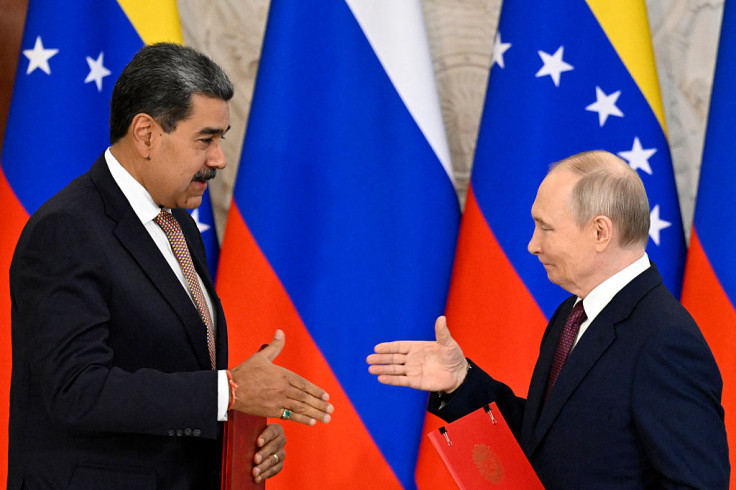
Venezuela's authoritarian President Nicolás Maduro asked Russia this month to overhaul the country's defensive radars, repair military aircraft, and potentially supply missiles, according to internal U.S. government documents obtained by The Washington Post.
The outreach comes amid escalating tensions, including U.S. strikes on alleged drug-trafficking vessels off Venezuela's coast and elsewhere in the region.
In a written message sent to Russian President Vladimir Putin, Maduro requested financing and logistical support. The documents indicate that Venezuelan officials approached China and Iran with similar requests, including drones and electronic warfare tools. It remains unclear how either country responded.
On Sunday, an Il-76 military cargo aircraft previously sanctioned by the United States arrived in Caracas after routing around Western airspace. The visit came a day after Moscow ratified a new strategic agreement with Caracas. Kremlin spokesperson Dmitry Peskov said on Thursday that Russia "respects Venezuela's sovereignty" and believes the situation should be resolved under international law.
These developments come as the United States expands its military footprint in the Caribbean and Pacific as part of an anti-narcotics campaign. U.S. officials have carried out more than a dozen strikes since September, killing at least 61 people.
The documents reviewed by the Post indicate that along with radar and aircraft restoration, Venezuela asked Russia to assist in overhauling eight engines, five radars, and to provide as many as 14 missile systems. U.S. records say Maduro emphasized that Russian-made Sukhoi fighters remain Venezuela's most important deterrent. He also proposed a three-year financing plan through Russia's state defense conglomerate, Rostec. Whether Moscow agreed is unknown.
Even as Maduro seeks deeper support, analysts cited by the outlet say Moscow's willingness and ability to assist may now be limited as Russia is heavily engaged in its war in Ukraine, has been reorienting resources toward other Latin American partners, and is showing less appetite for major new commitments.
"The reality is that Russia has been relatively quiet on Venezuela," said Douglas Farah, president of IBI Consultants. "And they've spent very little political capital defending Maduro."
James Story, former U.S. ambassador to Venezuela, noted that the U.S. military buildup in the Caribbean could itself serve Russian interests. "Our renewed interest in all things Western Hemisphere divides our attention on Ukraine. And that's a good thing for Putin," he said.
Russian support has also eroded in practical terms. Much of the equipment purchased under former President Hugo Chávez is reportedly nonoperational. One former Venezuelan military official told the Post that by 2018, "Venezuela had fewer than five Russian-built Sukhois operating." Analysts say many Russian-supplied systems are outdated and would pose little challenge to U.S. forces.
Despite these constraints, Moscow retains significant economic interests. Russian state companies hold stakes in joint ventures producing roughly 11 percent of Venezuela's crude and maintain lucrative exploration rights for untapped reserves.
© 2025 Latin Times. All rights reserved. Do not reproduce without permission.






